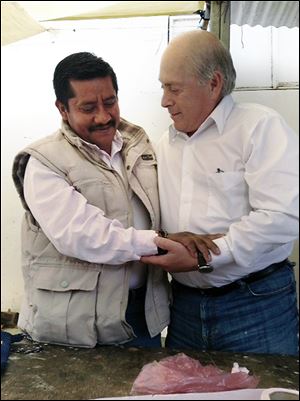
HUMAN RIGHTS
Velasquez tries to rally jobless locals in Mexico
Labor leader meets political prisoners
7/9/2013
Baldemar Velasquez, right, president of the Toledo-based Farm Labor Organizing Committee, meets Mexico's Alberto Patishtan, a former Mexican college professor, in Tzotzil State Prison.
For the second time in less than a week, farm labor leader Baldemar Velasquez was behind bars — this time there to visit political prisoners in Mexico.
Mr. Velasquez, president of the Toledo-based Farm Labor Organizing Committee, spent the last week campaigning for human rights and trying to rally the indigenous people of Chiapas, who are in a fight with their government over land.
Chiapas is located in the southernmost state of Mexico, in one of the most dangerous and politically corrupt parts of the country, according to human rights organizations across the world.
“It’s the Zapatistas’ land, but the government wants it for mining,” Mr. Velasquez said during a phone interview from Mexico. “It’s natural for people to rise up and try to fight it.”
Some politicians and law enforcement in Mexico are well known for taking bribes to enact new laws, ignore the breaking of existing laws, or arresting political enemies on trumped-up charges, Javier Olivia, a researcher at the National Autonomous University of Mexico who studies defense and security, recently told the Associated Press.
Mr. Velasquez, along with some community and religious leaders in Mexico, said many American corporations have taken advantage of that corruption by using bribes to silence politicians and law enforcement from questioning their actions.
One of the primary reasons for Mr. Velasquez’s trip was to begin working with and organizing residents without jobs in Chiapas and surrounding villages.
Mr. Velasquez is working with human rights attorneys in Mexico and several U.S. government officials.
During his trip, Mr. Velasquez always was shadowed by several armed professional guards. The mission was cloaked in secrecy because it’s believed some government officials in Mexico and the United States are being bribed.
Mr. Velasquez’s trip to Mexico was trumpeted for several days before his arrival by numerous Mexican newspapers and television news programs. Mr. Velasquez was followed closely by the media during his entire trip.
For many, the highlight was Mr. Velasquez’s visit July 4 with Alberto Patishtan, who is a former Mexican college professor, in Tzotzil State Prison.
Thirteen years ago, Patishtan was imprisoned after leading several nonviolent rallies to oppose the Mexican government and American corporations’ actions.
The meeting was very emotional, said Mr. Velasquez, who spoke about the experience with The Blade by phone later that night.
“I felt very humbled by [Patishtan’s] reaction,” Mr. Velasquez said. “He said, ‘I want you to know how much my spirits have been bolstered by your presence. I felt a mighty spiritual wind sweep in when you entered the area.’ ”
The Mexican government has offered to pardon Patishtan and set him free if he admits guilt and promises to no longer oppose the government.
“That’s why the federal government doesn’t want him out — he would continue to protest,” Mr. Velasquez said. “The president would have to offer him amnesty before he would leave prison.”
Mexico’s legal system will allow Patishtan to appeal his sentence one last time in two weeks, Mr. Velasquez said.
Before they parted ways, Patishtan shared a few last words with his visitor.
“I pray the Lord will open the door and justice will see the light,” Patishtan said.
Shortly after Mr. Velasquez’s visit, government officials released a group of nine political prisoners. Patishtan was not included in the group, according to news reports.
Contact Federico Martinez at fmartinez@theblade.com or 419-724-6154.